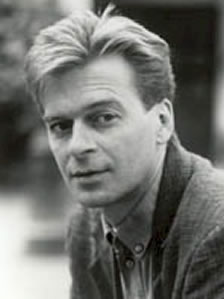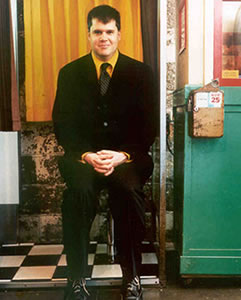De Engelse dichter, essayist en schrijver Stephen Spender werd geboren op 28 februari 1909 in Londen. Zie ook mijn blog van 28 februari 2007 en ook mijn blog van 28 februari 2008.
Listen
Deep in the winter plain, two armies
Dig their machinery, to destroy each other.
Men freeze and hunger. No one is given leave
On either side, except the dead, and wounded.
These have their leave; while new battalions wait
On time at last to bring them violent peace.
All have become so nervous and so cold
That each man hates the cause and distant words
Which brought him here, more terribly than bullets.
Once a boy hummed a popular marching song,
Once a novice hand flapped the salute;
The voice was choked the lifted hand fell,
Shot through the wrist by those of his own side.
From their numb harvest all would flee, except
For discipline drilled once in an iron school
Which holds them at the point of a revolver.
Yet when they sleep, the images of home
Ride wishing horses of escape
Which herd the plain in a mass unspoken poem.
Finally, they cease to hate: for although hate
Bursts from the air and whips the earth like hail
Or pours it up in fountains to marvel at,
And although hundreds fell, who can connect
The inexhaustible anger of the guns
With the dumb patience of these tormented animals?
Clean silence drops at night when a little walk
Divides the sleeping armies, each
Huddled in linen woven by remote hands.
When the machines are stilled, a common suffering
Whitens the air with breath and makes both one
As though these enemies slept in each other’s arms.
Only the lucid friend to aerial raiders,
The brilliant pilot moon, stares down
Upon the plain she makes a shining bone
Cut by the shadow of many thousand bones.
Where amber clouds scatter on no-man’s-land
She regards death and time throw up
The furious words and minerals which kill life.
In memoriam M.A.S
There are some days the happy ocean lies
Like an unfingered harp, below the land.
Afternoon guilds all the silent wires
Into a burning music for the eyes
On mirrors flashing between fine-strung fires
The shore, heaped up with roses, horses, spires
Wanders on water tall above ribbed sand.
The motionlessness of the hot sky tires
And a sigh, like a woman’s from inland,
Brushes the instrument with shadowy hand
Drawing across those wires some gull’s sharp cry
Or bell, or shout, from distant, hedged-in, shires;
These, deep as anchors, the hushing wave buries.
Then from the shore, two zig-zag butterflies
Like errant dog-roses cross the bright strand
Spiralling over waves in dizzy gyres
Until the fall in wet reflected skies.
They drown. Fishermen understand
Such wings sunk in such ritual sacrifice.
Remembering legends of undersea, drowned cities.
What voyagers, oh what heroes, flamed like pyres
With helmets plumed have set forth from some island
And them the seas engulfed. Their eyes
Distorted to the cruel waves desires,
Glitter with coins through the tide scarcely scanned,
While, far above, that harp assumes their sighs.

Stephen Spender (28 februari 1909 – 16 juli 1995)
De Belgische-Franse dichter, schrijver, essayist, dramaturg en scenarioschrijver Luc Dellisse werd geboren op 28 februari 1953 in Brussel. Hij studeerde filosofie en letteren aan de universiteit van Leuven. In 1996 vestigde hij zich in Frankrijk. Daar studeerde hij vervolgens aan de Sorbonne en aan de lÉcole supérieure de réalisation audiovisuelle (Esra). In 1999 werd hij Frans staatsburger.
Uit: Le testament belge
„J’aimais l’existence légère, et le tragique réduit à rien, en attendant la mort, le plus tard possible. Je vivais dans un pays qui prenait tout au sérieux, qui n’avait pas eu de XVIIIe siècle, qui confondait la légèreté avec la sécheresse de coeur.
Entre ce pays et moi, aucune tendresse n’était possible. Je me changeais en passe-muraille, vingt fois par jour, pour le traverser comme un mur de fumée. De son côté, il veillait à ce que je ne possède rien, que je ne sois rien, que mon nom soit silence. Tout cela sans affres et même dans un certain confort. Nous vivions ainsi une paix séparée, qui n’empêchait pas, de temps à autre, les coups droits.
Ce pays s’appelait la Belgique ; c’était un royaume ; il pratiquait la paix sociale et l’indifférence civique ; en ce sens, il n’était pas trop difficile d’y survivre et de vaquer à ses fins dernières ; à condition d’être sans espoir.
Pour survivre il fallait quand même un peu d’argent et un peu de chaleur humaine, bon an, mal an. Je m’y attachais avec obstination. Les résultats étaient intermittents. Je n’existais dans les yeux de personne. Sans le pacte secret qui se noue parfois, la nuit, entre une femme et un homme, j’aurais été un paria. Peut-être même n’aurais-je pas eu de corps. Mon esprit aurait fini par exploser en plein vol.
Tout cela durait depuis quarante ans. Ma vie au jour le jour, dans l’invisibilité, ne m’assurait que le strict minimum vital. J’étais conscient de n’avoir aucune place dans la société. Je me réfugiais dans l’éternité, raturant sur mes genoux des fragments de poèmes qui paraissaient de loin en loin dans des revues plus obscures que la mort. Je m’en tirais par accident, sans jamais exercer de profession précise. Vivant entre trois ou quatre villes, j’étais de passage dans chacune d’elles et citoyen nulle part.“
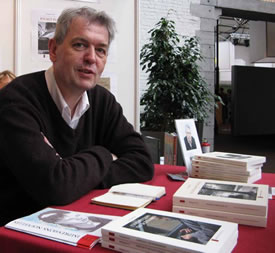
Luc Dellisse (Brussel, 28 februari 1953)
De Duitse schrijver Bodo Morshäuser werd geboren op 28 februari 1953 in Berlijn. Zie ook mijn blog van 28 februari 2007 en ook mijn blog van 28 februari 2008.
Uit: In seinen Armen das Kind
“„Es ist noch nie alles erzählt worden. Interessant wäre doch eine Geschichte des Niegesagten. Jeder Mensch trägt Wissen mit sich herum, das er nicht weitererzählt. Ein Kompendium des Nicht-Weitererzählten, eine Sammlung der normalen Geschehnisse macht mir in der Vorstellung größte Lust. Nur könnte dieses Werk niemals nur ein Mensch schreiben. Man kann ihn wohl nicht schreiben, sondern nur denken: Den Gesellschaftsroman in dem Sinne, dass die ganze Gesellschaft an ihm mitgeschrieben hat, und Thema sind die Sachverhalte, die die Menschen einander aus Liebe, Scham, Angst oder Eigensinn nie weitererzählt haben!“
Bodo Morshäuser (Berlijn, 28 februari 1953)
De Ierse dichter John Montague werd geboren in New York op 28 februari 1929. Zie ook mijn blog van 28 februari 2007 en ook mijn blog van 28 februari 2008.
Blessing
A feel of warmth in this place.
In winter air, a scent of harvest.
No form of prayer is needed,
When by sudden grace attended.
Naturally, we fall from grace.
Mere humans, we forget what light
Led us, lonely, to this place.
No Music
I’ll tell you a sore truth, little understood
It’s harder to leave, than to be left:
To stay, to leave, both sting wrong.
You will always have me to blame,
Can dream we might have sailed on;
From absence’s rib, a warm fiction.
To tear up old love by the roots,
To trample on past affections:
There is no music for so harsh a song.

John Montague (New York, 28 februari 1929)
Brons door John Coll
De Amerikaanse schrijver Daniel Handler werd geboren op 28 februari 1970 in San Francisco, Californië. Zie ook mijn blog van 28 februari 2007.
Uit: The Basic Eight
„August 25, Verona
Dear Adam,
Well, you were right—the only way to really look at Italy is to stop gaping at all the Catholicism and just sit down and have some coffee. For the past couple of hours I’ve just been sitting and sipping. It’s our last day in Verona, and my parents of course want to visit one hundred thousand more art galleries so they can come home with a painting to point at, but I’m content to just sit in a square and watch people in gorgeous shoes walk by. It’s an outdoor cafe, of course.
The sun is just radiant. If it weren’t for my sunglasses I’d be squinting. I tried to write a poem the other day called “Italian Light” but it wasn’t turning out so well and I wrote it on the hotel stationery so the maid threw it out by mistake. I wonder if Dante was ever suppressed by his cleaning lady. So in any case after much argument with my parents over whether I appreciated them and Italy and all my opportunities or not, I was granted permission—thank you, O Mighty Exalted Ones—to sit in a cafe while they chased down various objets d’art. I was just reading and people-watching for a while, but eventually I figured I’d better catch up on my correspondence. With all the caffeine in me it was either that or jump in the fountain like a Fellini movie I saw with Natasha once. You know Natasha, right, Natasha Hyatt? Long hair, dyed jet-black, sort of vampy-looking? “

Daniel Handler (San Francisco, 28 februari 1970)
De Franse schrijfster Raphaële Billetdoux werd geboren op 28 februari 1951 in Neuilly sur Seine. Zij schreef o.a. Mes nuits sont plus belles que vos jours, waar zij in 1985 de Prix Renaudot voor kreeg. Het boek werd verfilmd met in de hoofdrollen Sophie Marceau enJacques Dutronc.
Uit: C’est fou, une fille…
“Je t’aime parce que, avec toi, je suis moi, je peux être moi. Je t’aime parce que, avec toi, je ne suis plus moi, je peux, ne plus, être moi. S’ils avaient pu tout de suite, lorsque, après s’être unis, ils s’étaient lancés à ouvrir la bouche, entendre la dissonance qui mit leurs anges dos à dos, ils eussent su que les ennemis non pas viendraient du dehors, qu’ils occupaient la place déjà ; qu’on en comptait deux, pas plus.”

Raphaële Billetdoux (Neuilly sur Seine, 28 februari 1951)
De Franse schrijver, dramaturg en regisseur Marcel Pagnol werd geboren op 28 februari 1895 in Aubagne, Bouches-du-Rhône. Zie ook mijn blog van 28 februari 2007.
Uit: LE CHÂTEAU DE MA MÈRE
“Dans les pays du centre et du nord de la France, dès les premiers jours de septembre, une petite brise un peu trop fraîche va soudain cueillir au passage une jolie feuille d’un jaune éclatant qui tourne et glisse et virevolte, aussi gracieuse qu’un oiseau… Elle précède de bien peu la démission de la forêt, qui devient rousse, puis maigre et noire, car toutes les feuilles se sont envolées à la suite des hirondelles, quand l’automne a sonné dans sa trompette d’or.
Mais dans mon pays de Provence, la pinède et l’oliveraie ne jaunissent que pour mourir, et les premières pluies de septembre, qui lavent à neuf le vert des ramures, ressuscitent le mois d’avril. Sur les plateaux de la garrigue, le thym, le romarin, le cade et le kermès gardent leurs feuilles éternelles autour de l’aspic toujours bleu, et c’est en silence au fond des vallons, que l’automne furtif se glisse: il profite d’une pluie nocturne pour jaunir la petite vigne, ou quatre pêchers que l’on croit malades, et pour mieux cacher sa venue il fait rougir les naïves arbouses qui l’ont toujours pris pour le printemps.
C’est ainsi que les jours des vacances toujours semblables à eux-mêmes, ne faisaient pas avancer le temps, et l’été déjà mort n’avait pas une ride.
Je regardai autour de moi, sans rien comprendre.
“Qui t’a dit que c’est l’automne?”
–Dans quatre jours c’est saint Michel, et les sayres vont arriver. Ce n’est pas encore le grand passage — parce que, le grand passage, c’est la semaine prochaine, au mois d’octobre…”
Le dernier mot me serra le coeur. Octobre! LA RENTRÉE DES CLASSES! »
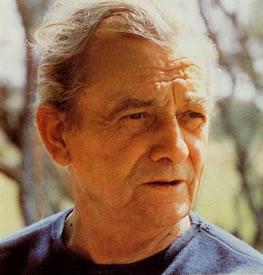
Marcel Pagnol (28 februari 1895 – 18 april 1974)
De Roemeense dichter Marin Sorescu werd geboren op 29 februari 1936 in Bulzeşti. Na zijn schoolopleiding volgde hij de militaire academie. Daarna studeerde hij aan de universiteit van Iaşi, waar hij in 1960 afstudeerde in moderne letteren. Zijn eerste boek Singur printre poeţi (“Eng: Alone Among Poets”), verscheen in 1964. Er volgden nog tien bundels. Ook schreef hij romans, essays en toneelstukken.
Superstition
My cat is washing herself
With the left paw
We shall have another war
For I notice
Whenever she washes
With her left paw
International tension grows
Considerably
How can she see
The five continents?
Maybe in her eyes
The pythoness moves
Who knows by heart
All the world’s unpuntuated history.
I feel like crying
When I think that both I
And the heaven of souls bundled
On my back
Should depend in the last instance
On a capricious cat
Go and catch mice
Never again unleash
World wars
Fuck off
You bitch.
Vertaald door Constantin Roman
Meer vertalingen van Constantin Roman zijn via deze website te vinden.

Marin Sorescu ( Bulzeşti, 29 februari 1936)
De Australische dichter en schrijver Donald Bruce Dawe werd geboren op 28 februari 1930 in Fitzroy, Melbourne. Zijn schoolopleiding maakte hij niet af. Via een omweg kon hij wel in 1953 een tijdje studeren aan de universiteit in Melbourne. In 1954 werd hij katholiek. Zijn vele baantjes – arbeider, postbode, luchtmacht officier, leraar brachten hemin contact met allerlei mensen met een verschillende achtergrond. Hij debuteerde in 1962 met No Fixed Address. Behalve talrijke dichtbundels publiceerde hij in 1983 ook een verzameling short stories.
Homecoming
All day, day after day, they’re bringing them home,
they’re picking them up, those they can find, and bringing them home,
they’re bringing them in, piled on the hulls of Grants, in trucks, in convoys,
they’re zipping them up in green plastic bags,
they’re tagging them now in Saigon, in the mortuary coolness
they’re giving them names, they’re rolling them out of
the deep-freeze lockers — on the tarmac at Tan Son Nhut
the noble jets are whining like hounds,
they are bringing them home
– curly heads, kinky-hairs, crew-cuts, balding non-coms
– they’re high, now, high and higher, over the land, the steaming chow mein,
their shadows are tracing the blue curve of the Pacific
with sorrowful quick fingers, heading south, heading east,
home, home, home — and the coasts swing upward, the old ridiculous curvatures
of earth, the knuckled hills, the mangrove-swamps, the desert emptiness…
in their sterile housing they tilt towards these like skiers
– taxiing in, on the long runways, the howl of their homecoming rises
surrounding them like their last moments (the mash, the splendour)
then fading at length as they move
on to small towns where dogs in the frozen sunset
raise muzzles in mute salute,
and on to cities in whose wide web of suburbs
telegrams tremble like leaves from a wintering tree
and the spider grief swings in his bitter geometry
– they’re bringing them home, now, too late, too early.
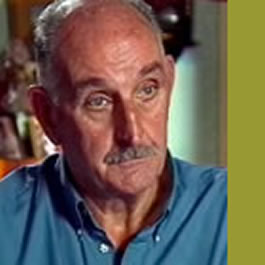
Donald Dawe (Fitzroy, 28 februari 1930)
Zie voor meer schrijvers van de 28e en ook de 29e februari eveneens mijn vorige blog van vandaag.





















